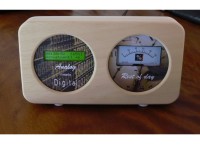Gadget: Rest of day clock - Analog meets Digital

Why gadget? Well, look on the WIKIPEDIA definition of this term:
Why gadget? Well, look on the WIKIPEDIA definition of this term:
>> Gadget denotes a technical tool or device with so far unknown function and/or special design. It is traditionally small, portable and often thought of as a novelty. The fun factor plays a major role. Devices which are defined as a gadget are often commuters between meaningful functionality and playfulness <<
To the point: No one really needs it, but everyone wants to have it. Who reads through the project description, will surely agree that this niche is fairly well on target.
Click on one of the links below to download the article:
English
German / Deutsch
French / Français
Dutch / Nederlands
This project will help to perceive the passage of time one day consciously. Who sleeps up to 12 clock noon, has perhaps never thought about that he has already slept through half the day. A glance at the clock says 12 o’clock, so what?! The type of perception is it that causes us to react that way.
Suppose we are in the car on the road and take a look at the fuel gauge. Does it show more than 50%, we are reassured. If the value is below 40%, we may already begin to think about, when we have to fill up gasoline the next time. The pointer level of an analog display is quickly to perceive and the level ,less than half ' or 'nearly full' can be recognized without much thought acrobatics.
It's the same with the time. It must be represented with a medium which appears to us from everyday life for granted. An analog meter is ideally suited for such a task. Take the time 14 o'clock for example. Suggestive, we imagine, we have much time for the rest of the day. If, however, it shows us that no more than about 40% of the day are left, our perception may change. Well enough of the philosophical excesses, let's look at the implementation of the project by reading the attached documents...
Documentation Revision 1.0
English documentation corrected
Documentation Revision 1.1
English and german documentation corrected



Discussion (1 commentaire(s))